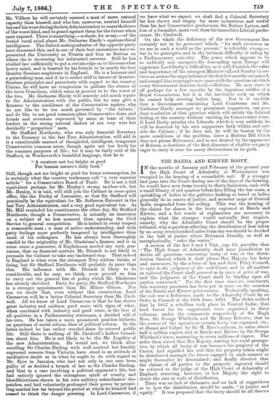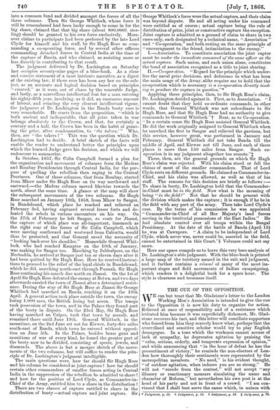THE BANDA AND KIRWEE BOOTY.
IN the months of January and February of the present year 1 the High Court of Admiralty at Westminster was
occupied in the hearing of a remarkable suit. If a stranger had gone into the Court during one of the days of the hearing, he would have seen from twenty to thirty barristers, each with a small library of red quartos before him filling the bar seats, a sprinkling of ladies in the galleries looking as bored as ladies generally do in courts of justice, and monster maps of Central India suspended from the ceiling. This was the hearing of the claims for shares in the booty captured at Banda and Kirwee, and a few words of explanation are necessary to explain what the stranger would naturally first inquire, namely, why the Admiralty Court should be the proper tribunal, why a question affecting the distribution of loot taken by an army seven hundred miles from any sea should be decided in the hall of justice where Britannia literally, as well as metaphorically, " rules the waves."
A section of the Act 3 and 4 Viet., cap. 65, provides that " The High Court of Admiralty shall have jurisdiction to decide all questions concerning booty of war, or the distri- bution thereof, which it shall please Her Majesty, her heirs and successors, by the advice of her and their Privy Council, to refer to the judgment of the said Court, and in all matters so referred the Court shall proceed as in cases of prize of war, and the judgment of the Court shall be binding upon all parties concerned." For the first time since its enactment, this statutory provision has been put in force on the occasion of the Banda and Kirwee prize-money. Technically speaking, the suit was a Reference, made to the Admiralty Court by an Order in Council of the 10th June, 1861. The Order recited that 'in 1857 a rebellion took place in Central India; that land forces for its suppression were organized in three columns, under the commands respectively of Sir Hugh Rose, Sir George Whitlock, and Sir Henry Roberts; that in the course of the operations certain booty was captured, viz., at Jhansi and Calpee by Sir H. Rose's column, in value about half a million rupees, and at Banda and Kirwee by Sir George Whitlock's force, amounting to seven millions of rupees. The order then stated that Her Majesty, waiving her royal preroga- tive, by which all booty of war becomes the property of the Crown, had signified her will that the property taken might be distributed amongst the forces engaged in such manner as might thereafter be determined ; and finally directed that the claims of all parties to the property captured should be referred to the judge of the High Court of Admiralty of England, reserving, however, to her Majesty the right to direct the rate or scale of distribution.
There was no lack of claimants, and no lack of suggestions as to how the distribution should be made, " in justice and equity." It was proposed that the booty should be all thrown into a common fund and divided amongst the forces of all the three columns. Then Sir George Whitlock, whose force it will be remembered had been lucky enough to come in for the big share, claimed that that big share (about 800,000/. ster- ling) should be granted to his own force exclusively. More- over claims to participate had been preferred by the late Lord Clyde for himself and his staff, by Sir Hugh Rose as com- manding a co-operating force, and by several other officers commanding detached forces in Central India at the time of the capture of Banda, and who claimed, as assisting more or less directly in contributing to that result.
The judgment delivered by Dr. Lushington on Saturday last occupies seventy-nine pages of a blue-book. As a clear and concise statement of a most intricate narrative, as a digest of the existing law, if there ever has been any law on the sub- ject, as an accurate and logical decision based on principles " created," as it were, out of chaos by the venerable Judge, and lastly, as a marvellous intellectual feat for a man entering his eighty-fifth year, involving, as it did, an enormous amount of labour, and evincing the very clearest intellectual vigour, the judgment of Dr. Lushington in the Banda booty case is very remarkable. He starts from the proposition, "which is both ancient and indisputable, that all prize taken in war belongs absolutely to the Crown, and that, for certainly a century and a half, the Crown has been in the habit of grant- ing the prize, after condemnation, to 'the takers.' " Who, then, are " the takers ? " This was the question which Dr. Lushington had to decide. A brief sketch of the facts will enable the reader to understand better the principles upon which the learned Judge gave his decision, and which we will endeavour to summarize.
In October, 1857, Sir Colin Campbell formed a plan for the organization and movement of columns from the Madras and Bombay Presidencies through Central India, for the pur- pose of quelling the rebellion then raging in the Central Provinces. One of these columns, that from Bombay, started from Mhow under Sir Hugh Rose on its way northward and eastward,—the Madras column moved likewise towards the north, about the same time. A glance at the map will show the subsequent movements of the two columns. Sir Hugh Rose marched on January 10th, 1858, from Mhow to Saugor, in Bundelcund, which place he reached and relieved on February 3rd, having captured several lesser forts and de- feated the rebels in various encounters on his way. On the 27th of February he left Saugor, en route for Jhansi, the capture of which place was all-important, inasmuch as the right rear of the forces of Sir Colin Campbell, which were moving southward and westward from Calcutta, would thus be protected, and that General saved the necessity of "looking back over his shoulder." Meanwhile General Whit- lock, who had reached Kamptee on the 10th of January, was making for Saugor too. Marching by Jubbulpore, on the Nerbudda, he arrived at Saugor just ten or eleven days after it had been quitted by Sir Hugh Rose. Here he received instruc- tions to proceed to the relief of the loyal chiefs in Bundelcund, which he did, marching north-east through Punnah, Sir Hugh Rose continuing his march due north on Jhansi. On the 1st of April Sir Hugh Rose defeated the enemy at Betwa, and two days afterwards carried the town of Jhansi after a determined resist- ance. During the stay of Sir Hugh Rose at Jhansi Sir George Whitlock had marched on Banda, reaching it on the 19th April. A general action took place outside the town, the enemy losing 1,000 men, the British losing but seven. The troops took possession of the town, and in the Palace they found part of the booty in dispute. On the 23rd May, Sir Hugh Rose having marched on Calpee, took that town by assault, and remained there until June 19th. General Whitlock, in the meantime, on the 2nd June set out for Kirwee, forty-five miles south-east of Banda, which town he entered without opposi- tion on June 5th. In the Palace, besides brass guns and munitions of war of every kind, he found the greater part of the booty now to be divided, consisting of specie, jewels, and diamonds. The above is but a meagre sketch of the move- ments of the two columns, but will suffice to render the prin- ciple of Dr. Lushington's judgment intelligible. The main questions were, how far should Sir Hugh Rose and his column be considered as joint captors ? how far should certain other commanders of smaller forces acting in Central India in the suppression of the rebellion be admitted to share ? and how far the position of Lord Clyde, as Commander-in- Chief of the Army, entitled him to a share in the distribution ?
There are two classes of captors entitled to share in the distribution of booty—actual captors and joint captors. Sir George Whitlock's force were the actual captors, and their claim was beyond dispute. He and all acting under his command were entitled as of course ; actual capture being the rule of distribution of prize, joint or constructive capture the exception. Joint capture is admitted as a ground of claim to share in two cases only, each designated by a technical name, " Association " and " Co-operation," and both resting on the same principle of " encouragment to the friend, intimidation to the enemy."
I.—Association. To constitute association the joint captor must be under the immediate command of the same officer as the actual captors. Such union, and such union alone, constitutes the bond of association recognized as a title to joint sharing.
IL—Co-operation. "Regard for the principle which under- lies the naval prize decisions, and deference to what has been the main usage of the Army, alike require me to hold that the co-operation which is necessary is a co-operation directly tend- ing to produce the capture in question."*
Applying these principles, then, to Sir Hugh Rose's claim, Dr. Lushington decided against it. First, as to Association. " I cannot doubt that they held co-ordinate commands, in other words, that General Whitlock was not subordinate to Sir Hugh Rose, and that Sir Hugh Rose had no authority to give commands to General Whitlock."t Next, as to Co-operation. "In a certain sense Sir Hugh Rose assisted General Whitlock. He did the work originally assigned to General Whitlock when he marched the first to Saugor and relieved the garrison, but this service, however great, was performed in January and February. General Whitlock did not take Banda till the middle of April, and Kirwee not till June, and each of these places is more than 150 miles from Saugor. Such co- operation is in my judgment altogether too remote.1 These, then, are the general grounds on which Sir Hugh Rose's claim was rejected. With his claim stood or fell the claims of most of the smaller commanders. That of Lord Clyde rests on different grounds. He claimed as Commander-in- Chief, and his claim was allowed, as well as that of his staff. The reasons for this decision are briefly as follows :- To share in booty, Dr. Lushington held that the Commander- in-Chief must be in the field. Now what is the meaning of being " in the field?" Not that he should be present with the division which makes the capture ; it is enough if he be in the field with any part of the army. Then take Lord Clyde's case. By the terms orhis commission he was appointed Commander-in-Chief of all Her Majesty's land forces serving in the territorial possessions of the East Indies." He had absolute control over all troops within the Bengal Presidency. At the date of the battle of Banda (April 19) he, was at Cawnpore. " A claim to be independent of Lord Clyde, which never was, never could be, asserted in the field, cannot be entertained in this Court."§ Volumes could not say more.
Here our space compels us to leave this very bare analysis of Dr. Lushington's able judgment. With the blue-book is printed a large map of the territory named in the suit and judgment, and it further contains a resume of many of the most im- portant sieges and field movements of Indian campaigning, which renders it a delightful book for a spare hour. The style is clearness and terseness itself.































 Previous page
Previous page